The Thought Factory
In 1993, Rice’s Baker Institute for Public Policy was founded to build a bridge between “the world of ideas and the world of action.”
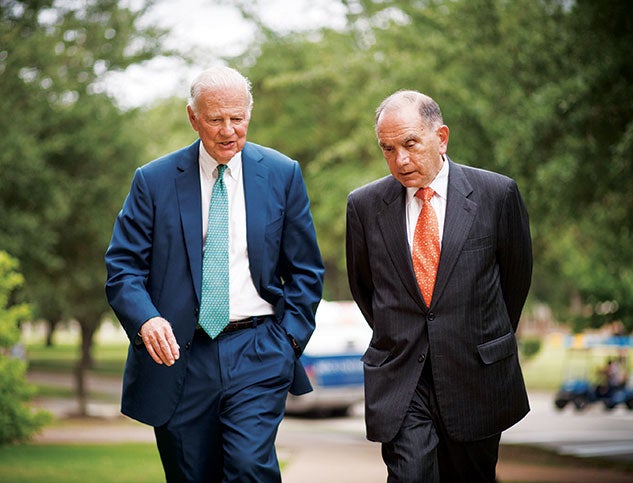
Two political veterans shared the stage at the Baker Institute to discuss electoral reform. But the fun really began when they turned their attention to contemporary politics.
It was spring 2008, when then-Sen. Barack Obama was emerging as the Democratic Party’s nominee for president. Former Secretary of State James A. Baker III urged the Democrats to offer the vice presidential slot to Obama’s main rival for the nomination, then-Sen. Hillary Clinton. “I think it would be highly unlikely for Obama to ask her to take [the vice president’s position],” said the other person on the stage, former President Jimmy Carter, “because I don’t see how it would help his ticket.” It would be a “strong ticket,” Baker countered, saying it would heal the divisions among Democrats opened up in the lengthy nomination process. “That would be the ticket the Republicans favor, I think,” Carter said. Both men laughed.
The scene, featuring two rivals who played major roles in the recent political history of the United States, models a pledge Baker made in 1994 at the opening ceremony of the think tank that bears his name. “Let me make one point very, very clear: The institute will be strictly nonpartisan.”
Being nonpartisan, Baker explained, did not mean it would avoid controversial topics. “Most public policy issues, after all, are part of our political debate. That’s what it means to live in a democracy,” he said. “For the institute to avoid them would undermine the very reason for its existence.”
For 25 years, the Baker Institute has been diving into the fray of our national conversations — on health care, immigration, energy, illegal drugs, wars, conflicts and more — lending scholarly expertise, empirical research and insights born of firsthand experience. By engaging these topics, the Baker Institute aims to arm policymakers with the research they need to craft solutions. But policymakers aren’t the only audience — Rice students benefit from having a policy-oriented “thought factory” on campus. For the general public, the Baker Institute is best known for its dynamic, wide-ranging (and often free) speaker series.
“We add an independent voice to whatever issues are being debated in our country — and globally,” said Baker Institute Director Edward P. Djerejian during a recent interview. “Independent, nonpartisan think tanks,” he added, “can add knowledge, data and studied opinions on issues that you just don’t find on the extremes — either the left or the right.”
A THINK TANK STARTUP
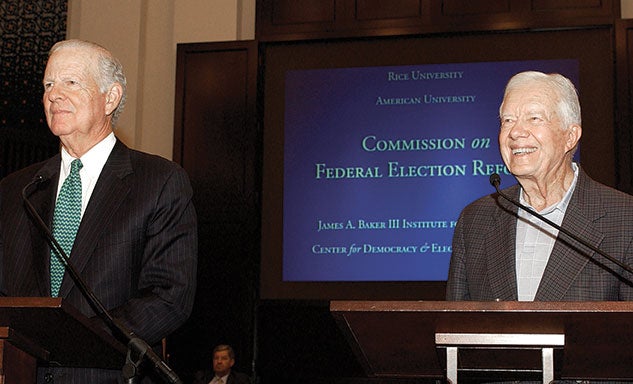
The origins of the Baker Institute go back to the 1980s and the Rice Institute for Policy Analysis (RIPA), which was headed by former Houston Mayor Kathy Whitmire. James Pomerantz, who served as dean of the School of Social Sciences, remembered that the reason Rice wanted a full-scale think tank was simple: “We just wanted a better RIPA, one that would draw national or international attention for its scholarship and policy impact.”
The first efforts to bring a public policy institute to Rice centered on then-President George H.W. Bush. Not long after he took office, he was presented with a proposal to locate the George H.W. Bush Presidential Library and Museum on or near the Rice campus. “We had several discussions about the location of the public portion of the presidential library and the concern that locating it on campus, with thousands of visitors, might overwhelm the campus and the neighborhood,” recalled former Glasscock School of Continuing Studies Dean Mary McIntire, who was dean of the School of Humanities at the time.
When Bush declined the offer, the focus shifted to his secretary of state. During his 1991 commencement address, Baker underscored his long-standing ties to Rice, beginning with his grandfather, Capt. James A. Baker, whose pivotal role in the university’s founding has become the stuff of legend.
One of those paying particular attention to that speech was Richard Stoll, the Albert Thomas Chair in Political Science. Pomerantz said Stoll tipped him off in late 1992 that Bush could well lose his re-election bid, thus making Baker available to help launch the institute. “Ric turned out to be correct,” Pomerantz said. “I gave him our Bush library proposal, and he worked with the faculty to develop it into a full-fledged Baker Institute proposal.”
Stoll put together a memo (a framed copy of which is on display in the Baker Institute lobby) that he sent to George Rupp, Rice’s president. Rupp responded in a handwritten note at the bottom, “I do think it is worth pursuing.” Baker agreed to the proposal, and ground was broken for the Baker Institute Oct. 20, 1994.
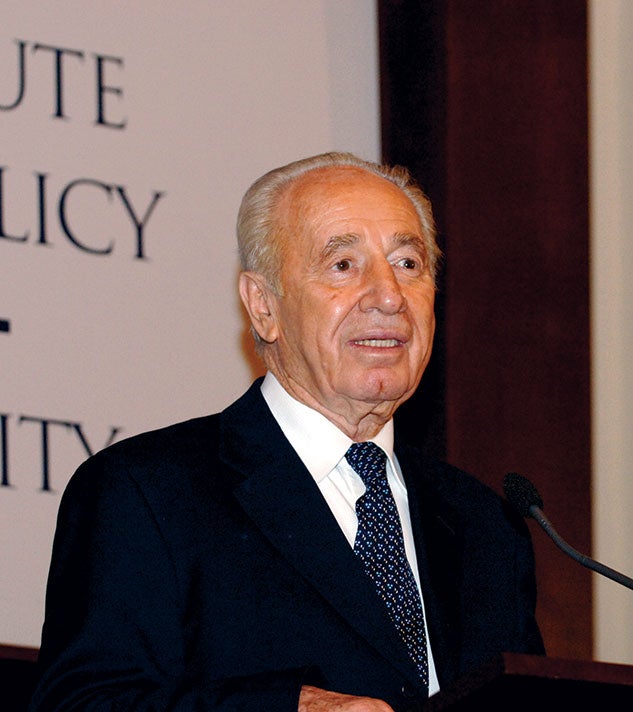
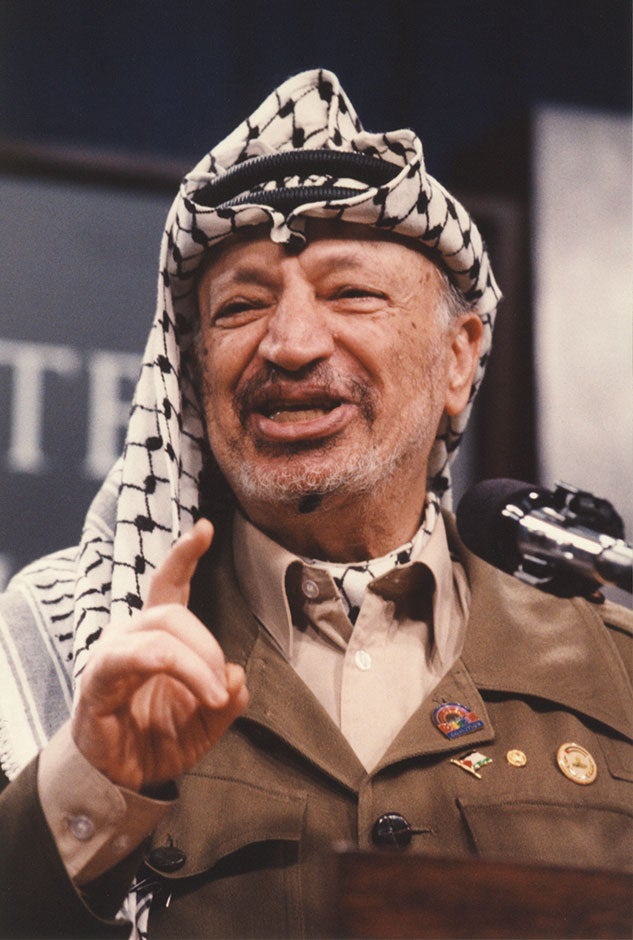
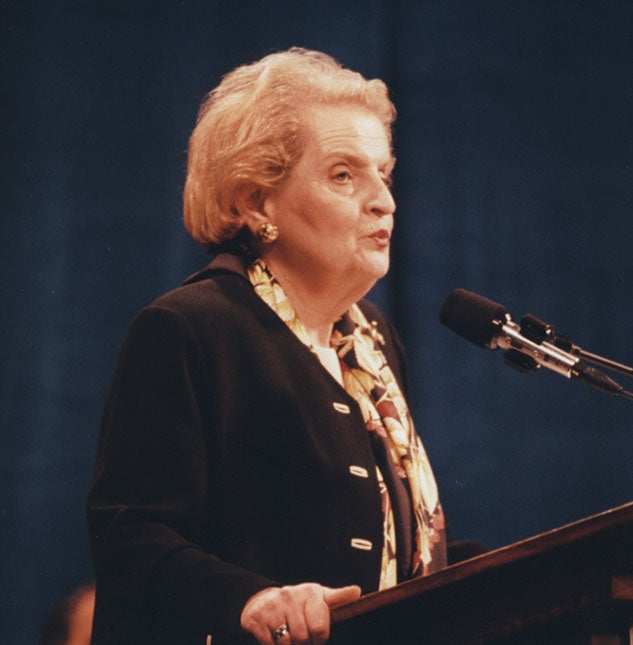
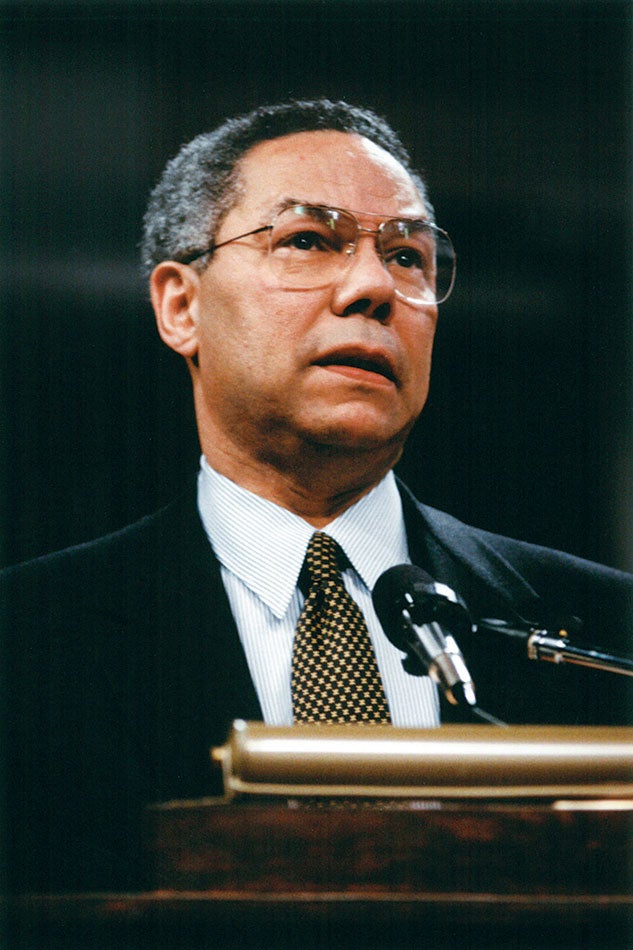
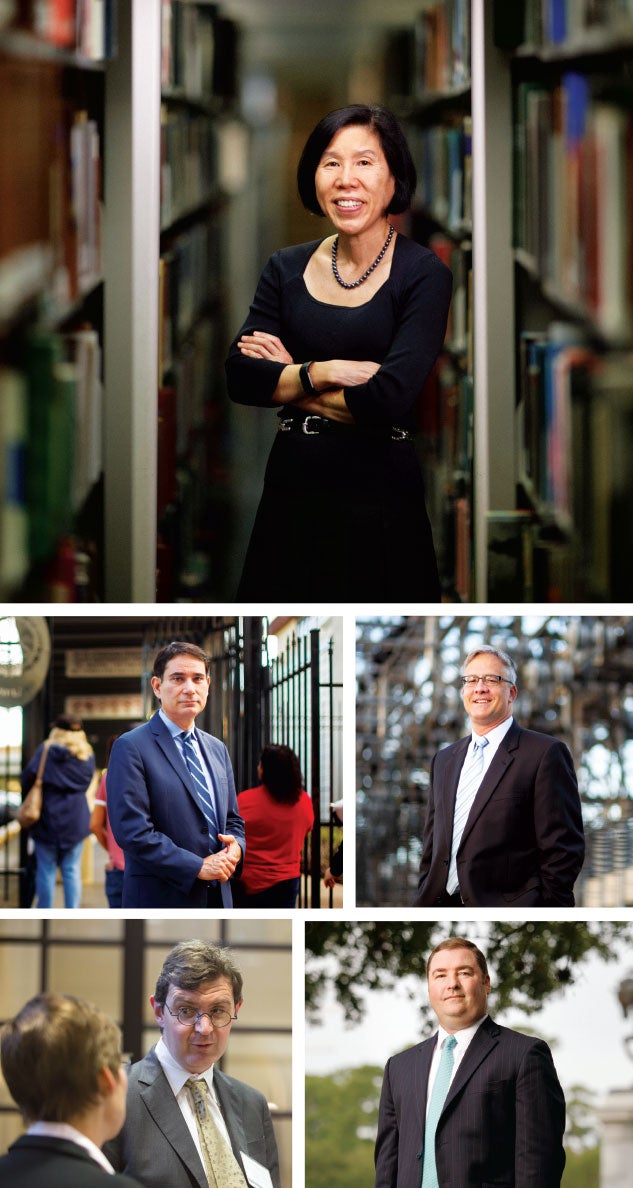
Djerejian pointed out that in the early years, the think tank “concentrated largely on a research agenda based on the principle of comparative advantage: What did we have here that we could build on?” Rice’s physical proximity to Mexico, the Texas Medical Center and the global capital of the energy industry provided three areas for programmatic focus. Djerejian’s expertise in the Middle East — he served as a diplomat under eight administrations, including as assistant secretary of state for Near Eastern affairs, as well as U.S. ambassador to Syria and Israel — led to the creation of the Center for the Middle East.
EXPERTISE TO GO
Today, the Baker Institute’s programmatic focus has expanded exponentially: 16 research centers and programs with more than 50 research fellows, scholars and research staff working from its stately headquarters on the west quadrangle of Rice’s campus. That doesn’t include the dozens of Rice faculty members who hold appointments at the Baker Institute as well.
It’s these subject matter experts who make up the engine of the institute — serving up data and policy recommendations in the original areas of Middle East policy, health, energy and Mexico studies but also now in entrepreneurship, biomedical research, China studies, children’s health and public finance, for example. “Fellows produce and publish research, host events, make media appearances, provide recommendations to policymakers, inform the public, and work to further the reach and impact of their policy center or program,” said Allen Matusow, the William Gaines Twyman Professor Emeritus of History and the director of academic affairs at the Baker Institute.
Last year, Baker fellows met more than a dozen times with representatives from state and federal agencies — or legislators and their staff — and also testified at state and federal committee hearings. Likewise, local, state and national media turn to Baker scholars to go on record with informed commentary and context for the news of the day.
“Nearly a dozen different fellows from the Baker Institute have been either quoted in Texas Tribune stories or written pieces for TribTalk, our opinion page,” said Aman Batheja, the Tribune’s political editor. “It speaks both to the breadth of the institute’s policy experts and their commitment to making sure Texans across the state are being exposed to their research and analyses.” In the most recent fiscal year, the think tank tallied some 20,000 media citations.
All this activity and public engagement has led to a steady rise, to third place worldwide, in the latest ranking of university-affiliated think tanks. The ranking, published by the University of Pennsylvania’s Think Tanks and Civil Societies Program, places Baker just behind the London School of Economics’ IDEAS center and the Belfer Center at Harvard. “That’s very good company,” Djerejian said.
A HOME FOR FUTURE POLICYMAKERS
Djerejian cited the expansion of the Baker Institute’s role at Rice as the most important change in his quarter of a century at the helm. “I think the biggest evolution really has been our integration into the teaching functions of Rice and the student engagement across the board,” he said.
One of the most visible efforts to reach out to the undergraduate community was the creation of the Jesse Jones Leadership Center Summer in D.C. Policy Research Internship Program. Between six and 12 students are chosen to participate every year, said Steven Lewis, the C.V. Starr Transnational China Fellow and the program’s coordinator.
One of them was Eli Mensing ’20, who went to Washington, D.C., last summer to work at the National Association of Criminal Defense Lawyers. As preparation for the D.C. experience, all interns attend a series of seminars on political philosophy led by Lewis. The discussion models include the kind of civil dialogue that’s mostly missing in D.C. of late. “We were dealing with sensitive and often divisive topics,” Mensing said, “but discussion never got out of hand or became contests of who could say their opinion the loudest over everyone else.”
The Baker Institute Student Forum nurtures student research at the undergraduate level. The best papers are published in Rice’s Journal of Public Policy, said Joe Barnes, the Bonner Means Baker Fellow and a faculty adviser. Since 2014, graduate students have found new opportunities via graduate degree programs in global affairs and in energy economics.
WORLDS OF IDEAS
In Houston, at least, the general public is probably most likely to come into contact with the Baker Institute through its speaking events. Over the years, a long list of prominent statesmen, diplomats, religious leaders, writers, scientists and artists have been invited to speak on campus.
Speakers have included Palestine Liberation Organization Chairman Yasser Arafat (1997), Russian President Vladimir Putin (2001), future Israeli President Shimon Peres (2006) and former Pakistani President Pervez Musharraf (2011). At separate events in 2007, former President Bill Clinton and the Dalai Lama drew overflow crowds to Autry Court.
One of the most inspiring guest speakers was former South African President Nelson Mandela. Baker recalled that he [Baker] was “one of the first, if not the very first, foreign leader to meet with Nelson Mandela after he was freed from prison in 1990.” Nine years later, Baker cooperated with Saudi Arabia’s ambassador to the United States at the time, Prince Bandar bin Sultan, to bring Mandela to Rice.
One question from the audience especially struck Djerejian. “It was from a 12th-grader who asked, ‘Who are you really, Mr. Mandela, and how do you think history will judge you?’” Djerejian remembered. “Mandela paused and then said, ‘I never wanted to be regarded as an angel. I am an ordinary man with weaknesses. I am not a saint, unless you think of a saint as a sinner who keeps trying.’ You could hear a pin drop in the hall and then a standing ovation. Unforgettable!”
Looking back at his more than half a century at Rice, Matusow argued that the Baker Institute has done a lot to change the Rice culture. “For decades in my time here, people talked about Rice behind the hedges, which was a metaphor for the monastic isolation of the place,” he said. “The Baker Institute brought the world outside the hedges onto the campus. On almost any day of the week, statesmen, politicians, opinion leaders and scholars visit Baker to discuss issues that matter nationally and globally.”
Matusow added, “We offer a variety of opportunities to an eager undergraduate constituency interested in public policy. We offer our student interns the chance to do serious policy research. Our fellows offer well-reviewed policy courses in the academic departments. Rice has always been a great educational institution. The Baker Institute made it better.”
Looking ahead, Djerejian said he hopes the Baker Institute will remain “an agile instrument that can start programs, end programs, bring in talent, and be flexible and move with the times.” A new five-year plan for the future will ensure the Baker Institute continues to be “an instrument of creative change.”
Take a look at a timeline of the Baker Institute’s first 25 years here.
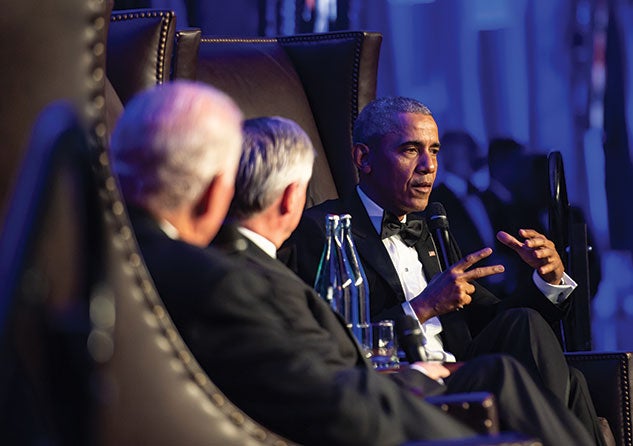
A HISTORIC CONVERSATION
Former President Barack Obama and former Secretary of State James A. Baker III spoke for nearly an hour in a conversation moderated by presidential historian Jon Meacham. The Nov. 27 event marked the 25th anniversary of Rice’s Baker Institute for Public Policy.
The institute has now hosted every living former president of the United States since its inception in 1993. “The motto we have chosen for this anniversary, ‘A Quarter Century -— Making History,’ bears particular resonance tonight,” said Baker Institute Director Edward P. Djerejian. “It symbolizes the culmination of our commitment to strive for excellence and nonpartisanship.” The gala raised $5.4 million to further the think tank’s research and programming.
Obama and Baker — who served in a series of top-level staff and cabinet positions under former Presidents Ronald Reagan and George H.W. Bush — devoted most of their conversation to the causes of heightened partisanship that developed between Baker’s first years in Washington and Obama’s presidency decades later. They largely agreed that a changing media landscape and partisan redistricting have caused the parties to diverge.
“The responsible center in American politics has disappeared,” said Baker, the institute’s honorary chair. “You have the advent of the internet, and that really makes it easy to be divisive. Divisiveness sells.”
In a discussion on foreign policy, Baker expressed concern over the state of international institutions and the current global standing of the U.S. “American leadership in the world is absolutely imperative; no other country can do it,” he said, underscoring that the U.S. won the Cold War “because we had alliances.” Obama, who praised Baker’s accomplishments in international diplomacy, agreed. “We have a stake in making sure that we have our act together enough,” he said. “Because everybody else, whether they admit it or not, tends to follow our lead.”
Take a look at the highlights from the conversation that took place between guest of honor Barack Obama and James A. Baker III at the Baker Institute’s 25th anniversary gala.
— Jeff Falk
